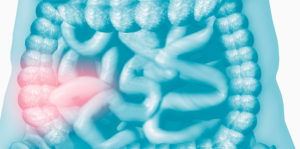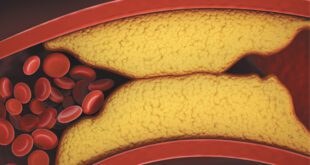By Digestive Health Associates
 Inflammatory bowel disease (IBD) is the name given to several chronic conditions that involves inflammation in all or some parts of your small and large intestines. The intestinal walls become inflamed, red, swollen and ulcers (sores) may develop. The two most common forms of IBD are Crohn’s disease and ulcerative colitis (UC).
Inflammatory bowel disease (IBD) is the name given to several chronic conditions that involves inflammation in all or some parts of your small and large intestines. The intestinal walls become inflamed, red, swollen and ulcers (sores) may develop. The two most common forms of IBD are Crohn’s disease and ulcerative colitis (UC).
Crohn’s disease can affect any part of the gastrointestinal tract from the esophagus to the rectum, but most commonly affects the last portion of the small bowel, the ileum, and the colon (large intestine). The inflammation extends deep into all layers of the intestinal wall in the affected region which can become ulcerated and the bowel wall may thicken. This thickening and scar tissue may cause narrowing (stricture) of the bowels. The ulcerations may develop into tunnels (fistulas) that may connect different parts of the bowels or connect the bowels to different organs such as the bladder or vagina.
Ulcerative colitis is an inflammation of the surface membrane lining of the colon (the large intestine) and rectum. It causes inflammation and sores (ulcers) in the top layer of the lining of the large intestine. UC occurs in continuous stretches of the colon and rectum.
What Causes IBD?
The cause of the disease is unknown, but researchers speculate that it may result from virus or bacteria triggering the body’s immune system. Under normal circumstances the immune system is the body’s defense mechanism against viruses and bacteria invading the body. Once the infection is cleared up, the immune system shuts off. In IBD the body’s immune system may overreact to the normal bacteria living in the digestive tract and it fails to shut off. This leads to a chronic inflammatory process. Because IBD tends to run in families, there may also be a genetic component in developing the disease. No evidence has been found to support the theory that inflammatory bowel disease is caused by tension, anxiety, or emotional stress, although these can aggravate the discomfort caused by the disease. Psychological factors may modify the course of the disease, and affect response to therapy.
Symptoms
As with other chronic conditions, a person with IBD experiences times of active disease flare ups and periods of remission (signs of the disease decrease and/or disappear).
• Abdominal pain and cramping
• Diarrhea, may often be bloody
• Feeling of urgency to have a bowel movement
• Reduced appetite and weight loss
• Fatigue
• Fever
• Iron deficiency anemia
Diagnosis
It’s important to talk with your physician if you experience any of the symptoms listed above. He or she will use your health history, physical exam and test results to diagnose IBD. Other diseases may be responsible for signs and symptoms of IBD so it is important for a physician to rule out other causes such as colon cancer, ischemic colitis, infection, diverticulitis and irritable bowel syndrome. Several tests may need to be performed to accurately diagnose IBD.
• Blood tests
• Stool sample
• Colonoscopy or sigmoidoscopy
• Barium enema
• Computerized tomography (CT scan)
• Magnetic resonance imaging (MRI)
• Capsule endoscopy
• Small bowel imaging
Treatment
There is currently no cure for IBD and not one specific treatment plan that works for all patients. The goal of treating IBD is to reduce the inflammation in the GI tract. Treatment for IBD usually involves drug therapy. There are many different classes of medications that can help reduce signs and symptoms of active disease and achieve long-
term remission. Some of the medications used to treat IBD are anti-inflammatories (Sulfasalazine, Mesalamine, Corticosteroids), immune system suppressors (Azathioprine, Cyclosporine, Infliximab-
Remicade, Adalimumab-Humira, Certolizumab pegol-Cimzia, Methotrexate), antibiotics (Flagyl, Cipro), anti-diarrheals, iron supplements, and nutritional supplements (vitamin B-12 shots, calcium and vitamin D). Other treatment options include surgery, changes in your diet, stress reduction and adequate sleep.
Your treatment plan will depend on the severity of your symptoms, which part of your GI tract is affected, and if you have other health problems outside of your GI tract. At Digestive Health Associates we will partner with you in managing this disease process to improve long-term prognosis and to limit complications caused by the disease.
DIGESTIVE HEALTH ASSOCIATES, PA
BHEEMA SINGU, M.D.
Board Certified Gastroenterologogist
352-840-1001
7558 SW 61ST AVE., UNIT 1, OCALA FL 34476
Check Also
Achieving Healthy Aging: Balancing Wellness and Financial Security
By Steve Schneider, MBA – CEO, Securenet Financial, LLC. In today’s world, aging is not …
 Central Florida Health and Wellness Magazine Health and Wellness Articles of the Villages
Central Florida Health and Wellness Magazine Health and Wellness Articles of the Villages



